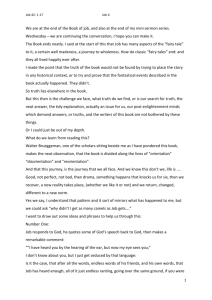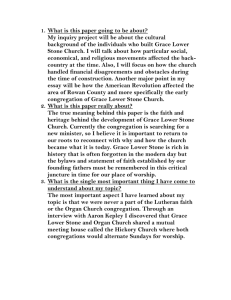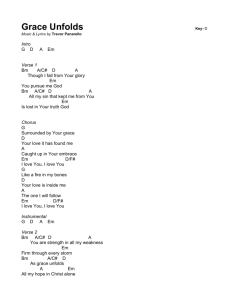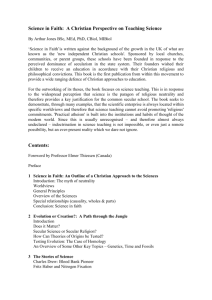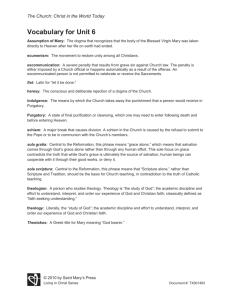File
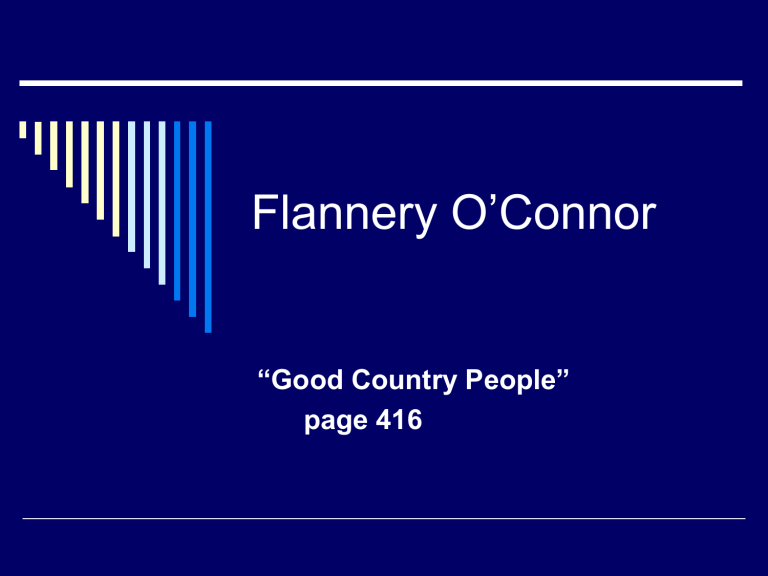
Flannery O’Connor
“Good Country People” page 416
“All human nature vigorously resists grace because grace changes us and the change is painful.”
Flannery O’Connor-
“Good Country People”
Characters:
Joy-Hulga. . . “Love is not a word I use. I don’t have illusions. I’m one of those people who see through to nothing.” This quote exemplifies her philosophy of “logical positivism,” and is also expressed in the “science” book her mother looks at earlier in the story.
Mrs. Hopewell. . .
like her name, she attempts to look upon the positive, often expounding popular cliches in an attempt to hold on to a conventional lifestyle .
Mrs. Freeman and her daughters. . . primarily serve the purpose of advancing our understanding of Mrs. Hopewell’s situation and her system of belief.
Manley Pointer. . . .
Notice the irony of his name and what we later learn about this traveling Bible salesman.
It was granted to me to carry away from my prison years…this essential experience: how a human being becomes evil and how good. In the surfeit of power I was a murderer and an oppressor. In my most evil moments, I thought I was doing good. It was only when I lay there on rotting prison straw that I sensed within myself the first stirrings of good.
Gradually it was disclosed to me that the line separating good and evil passes not through states, nor between classes, nor between political parties but right through every human heart. This line shifts. And even within hearts overwhelmed by evil, one small bright bridgehead of good is retained. And even in the best of all hearts, there remains... an unuprooted small corner of evil. I say without hesitation,
‘Bless you, prison, for having been in my life.’
Logical Positivism/ Empiricism
A central belief of logical positivism is the principle of verification, where a premise is meaningful only if it can be verified by scientific method. This is in contrast to metaphysical, theological, and ethical beliefs which are considered "cognitively meaningless,“ and serve merely to express the feelings or desires of a speaker, which cannot be verified. Only mathematical, logical and scientific statements are literally meaningful, or have truth values.
https://www.youtube.com/watch?v=72cpyZh2OaA&index=8&list=PLZ2aHG8xPVVEHnJhKSpQQW8TzHcsumeTM
Ravi Z asked by admitted empiricist. . .
While studying at the university, Joy rebelled against her mother’s conventional lifestyle and legally changed her name to the purposely ugly sounding “Hulga.” Now forced to live at home, she stumps around with an irritable expression and seizes any opportunity to make her mother appear stupid. No matter, Mrs. Hopewell still insists on calling her Joy.
Manichaeism
http://www.pbs.org/moyers/journal/blog/20
09/10/web_exclusive_glenn_greenwald.
html
Interview with Glenn Greenwald. . . .
Nihilism
The nihilist instinctively rejects faith because it gets in the way of pleasure.
Since there is no belief in an underlying purpose to life, one simply “lives for the moment.”
In the story this philosophy is best symbolized by the hollowed out Bible which is filled with the trappings of materialism: meaningless sex, intoxication, a selfish gratification.
What does “Good Country
People” attempt to tell us?
1. What is the significance of the names which
O’Connor selects for her characters in this story? Do you recognize any irony in these names?
2. What is the possibility for redemption at the conclusion to the story? Recall the verse which was quoted earlier: “He who loses his life will find it. . . “
Write for three or four minutes on each.
3. What are some examples of irony —start page
426.
“Certainty is the parent of fundamentalism, no matter what its source, but no thing, not even Atheism, exists without a purpose.”
Stephen Sparrow
JoyHulga’s certainty lies in the belief or the faith in
“nothing.” And it can be argued that she lives consistent with that “faith.” As a child, she admits, there were feelings of shame. But her education had removed the last traces of those feelings, and that same education had wiped out her doubts, replacing them with the certainty constructed around Science. . . . atheism
How is the “fallacy of certainty” (Stephen Sparrow’s term) an important theme in “Good Country
People?” And how, as “conservative Christians,” should we approach this notion of “certainty” in our system of belief?
Open-Ended Question:
Morally ambiguous characters -- characters whose behavior discourages readers from identifying them as purely evil or purely good -are at the heart of many works of literature.
Choose a novel or play in which a morally ambiguous character plays a pivotal role. Then write an essay in which you explain how the character can be viewed as morally ambiguous and why his or her moral ambiguity is significant to the work as a whole. Avoid mere plot summary.
OR
http://carnageandculture.blogspot.com/2007/
08/whos-afraid-of-flannery-oconnor.html
“Who’s Afraid of Flannery O’Connor,” by
Douglas Jones.
Still, something's odd about selling Flannery to Christians. Even when people know about her superior technique and Christian frames, they still usually choke after a story or two. Too rough.
Too troubling. They're not hard to read, they'll admit, but still, there's all that weirdness and death.
None of her stories, though, turns out to be as gruesome as common PG-13 fare. She places most of the ugliness off screen.
Her stories do not fit in horror categories at all. Her use of the grotesque and ugly doesn't delight in power or shock value. All her stories focus on grace, grace, grace. That's what they're about. Every one of them. Real people wrestling with bodily grace.
And that's what disturbs many readers. They don't want their grace black. It feels like an alien faith to them, and they resist it.
O'Connor herself heard this complaint. In her essay "The Catholic
Novelist in the Protestant South," she argued against that pietism typical of Christian readers: "The reader wants his grace warm and binding, not dark and disruptive."
In the course of the romantic interlude in the barn, Manley Pointer steals the artificial leg of Joy-Hulga. For those prepared to dig for the reality that
O’Connor is attempting to communicate, comes the jolting realization that it is not her virginity that she loses, but something of perhaps greater significance. . . . She loses her faith; her carefully constructed faith in nothing, which all through the story is symbolized by her wooden leg.
Note also the story of the Prodigal Son. . . . Luke
15:11ff.
Is this parable more about the “prodigal,” or is
Jesus’ focusing as much upon the elder brother and his “religious haughtiness?” One teacher speaks of the “younger brother idolatry” and the “older brother idolatry.” We notice the rebellion of those around us, but can we clearly recognize our own “idols?” In the words of Tim Keller, “Do we truly want the
Father, or merely the things of the Father?
This is idolatry.” Who in the story is a lot like the Prodigal, and who is like the older brother?
Note: Luke 13:22ff. when Jesus is asked a question about salvation by a “religious person.”
Behind the world there is a purpose, and behind the purpose stands the person of God, in whom resides all meaning. Otherwise, neither this world nor we can have any meaning.
. . .
This becomes a stumbling block for those who claim the presence of evil rules out the existence of God. . .
“If God does not exist because of evil, then what can evil take from a world devoid of meaning?” -Simone Weil-
“. . . Evil is not a problem to be solved but a mystery to be endured.”
Flannery O’Connor
Where does one find certainty? Again,
Jesus says that “I AM the way, the truth, and the life”
Is there a “certainty” in a system of beliefs or in a set of doctrines?
“All human nature vigorously resists grace because grace changes us and the change is painful.”
Flannery O’Connor-
Or is there certainty in the personal revelation of our Lord Jesus to us, as it lines up with Scripture?
A recent e-mail. . . . .
One of my classmates from a class last semester has become a new friend. His name is Nick, he's a sophomore track runner from Kansas and his father teaches at a Christian school there that sounds almost exactly like TCS. He's struggled a lot with his Christian identity since college as well, and like me is frustrated with the Christian Church (in general and the availability of a "good" church in the area). His father is not supportive of his personal exploration and tells him daily that he is on the wrong path and no longer in God's grace. I can't imagine how he deals with such damaging attacks from such a close personal relationship--honestly, i think it would drive me away from the Church all together to be faced with that narrow and sharplyarticulated view of Christianity day in and day out.
For many of us in the Christian faith we are not unlike Hulga, or Richard Dawkins, in attempting to find a sense of “certainty” in a system or a
“worldview,” that for the most part is abstract, but allows us to “prove” our belief. . . . Again, like Hulga we are unwilling or unable to confront our deepest fears or doubts. Faith, though, involves stepping outside this realm that we can control, into the relationship of trust. It means that we no longer are in control, but He is. . . .In order to experience this truth, we must, like Hulga, relinquish our own artificial leg for a relationship to our Eternal God. We must realize how “crippled” we really are. This is the message of O’Connor.
A Few Thoughts of my Own:
Is there a Christian worldview, and if so, who should define it? Or should we instead be learning to see that, in one sense, “everything is spiritual?” “Jesus is the way, the truth, and the life.” In placing by far the greatest emphasis upon that first word —”way”—we tend to built a dualistic view of our world. (By the way, this is probably more a Western view than a biblical view.) While the problem of evil in this realm is obvious, the problem is rooted in the taint of sin and death, a departure from “truth.” In viewing reality in a dualistic manner, though, we are forced to label ideas as well as people: good — bad; Christian —heathen; sacred—secular; liberal —conservative. What happens is that this dichotomy, to the sensitive seeking intellectual, will result in confusion when that individual arrives on the college campus.
For instance, the reality is that much of what is taught in most college classes possesses elements of “truth.” In fact, the largest percentage of what one hears — lets say 70%-would line up with “truth.”
Nevertheless, by forcing a dichotomy, a dualism, we in a sense force our Christian young people to make a choice that is based largely upon a misperception.
Should they believe what they have been taught in Sunday School and apply this as the basis of their “Christian education, or should they reject their roots for the alternative given in the college classroom.
“Truth” is, after all, an either-or proposition in this system of dualism. While there are moral absolutes, everything that is being taught on a secular college campus is not a lie or part of a
“humanistic worldview” that in its entirety stands at odds with “truth.”
And will not the “truth” at some point ultimately “set us free” and reveal “the way.” The word “reveal” is key, because it is the root of “revelation.”
How can I become “steadfast” in what I believe?
Should we be encouraging our young people to engage the teachings that they hear in college rather than cowering from them in fear? Must we view everything we hear outside the church with an attitude of mistrust or skepticism, something to be debated or argued?
Have we been successful in “passing the baton” to the next generation?
Note some of the findings of David
Kinnaman in “Unchristian”
Other Powerpoint. . . .

